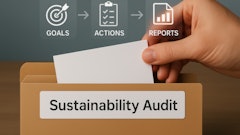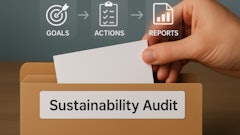
The supply chain crisis has prompted many businesses to focus urgently on sustainable sourcing. It’s a good idea, but they should go even further by integrating their overall environment, social and governance (ESG) strategies into their sourcing plans.
Indeed, two-thirds of the average company’s ESG footprint lies with suppliers, according to McKinsey. The cost of failure — even at multiple levels down the supply chain — can be catastrophic to a firm’s reputation. Major incidents have brought widespread attention and spurred enterprises worldwide to double down on sustainable procurement.
At the same time, investor expectations, along with increased regulatory oversight requirements — such as the German Supply Chain Due Diligence Act and the UK Modern Slavery Act — are compelling businesses to establish and execute ESG strategies and uphold high ethical standards.
Nevertheless, organizations often lack a holistic and aligned ESG strategy for their own operation and extended third-party network. One reason for this oversight could be that companies have not assigned a single overall ESG strategy leader, and so the strategy is not reflected in sourcing decisions, supplier reviews or category strategies.
Other reasons why organizations don’t embed ESG in sourcing include:
- The obscurity of supply chain networks, complicating the process of managing ESG-related risks, applying preventative guidelines/actions and responding to manifested supplier-related risks.
- Lack of supplier-related data. Without quality relevant data, purchasing entities have a tough time working with the right suppliers.
- Cost disadvantage. First movers in under-regulated areas bear an increased cost, leading to a decrease in their edge on price and competitiveness.
- Unclear benefits or value-added. It is difficult to put a monetary value on responsible sourcing programs, as they are often seen as “necessary evils” required to look good rather than a means of generating value.
A new role for the CSO
Companies do not need to delay their ESG journey until they have added a chief sustainability officer (CSO). At the early design stages, the CEO can own the effort and begin creating an integrated strategy. But, as the program matures, it requires the undivided attention of the CSO.
CSOs can take the holistic look needed to examine the impact the business is having on the world – its environment, people, governance — and then determine the best cross-company policies to promote sustainability. A proactive leader will look for synergies, areas where different departments can join forces to get a job done faster or better.
For example, the CSO is well-positioned to address emerging ESG issues related to sourcing, including workplace accidents, waste generated across facilities and renewables. But, before companies can report effectively, they need to obtain investor-grade ESG data — data that investors will trust as much as they do the company’s financial data. This requires teams to assimilate, accumulate and make sense of tremendous volumes of unstructured data, such as gender, training, workplace safety incidents, etc. When assembled, investor-grade data allows companies to effectively gauge ESG efforts vs. those of their peers.
It makes further sense for an integrated approach because the concept of “sustainability” is evolving so fast. New rules along with new technologies and capabilities are emerging at such a rapid pace that we can only dimly perceive what will be required in just a few years. Despite – or perhaps because of – this ambiguity, businesses need to start marshalling their resources, thinking creatively and accelerating their journey. It’s estimated that about 70% of organizations are still in the beginning phases of building a truly sustainable enterprise.
The benefits of putting sustainability at the heart of corporate strategy are multi-fold – from boosting profits to improving the company’s reputation and making it more likely to attract and retain talent. In an era when a business’s sustainability, ESG and sourcing activities are critical to employees, customers, regulators and investors alike, pursuing an integrated strategy could be a winning move.


















